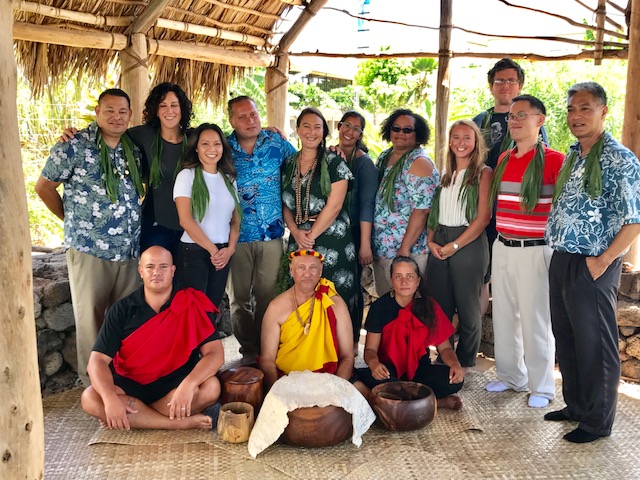A team of four University of Hawaiʻi–West Oʻahu faculty members were awarded $50,000 for their COVID-19 related research project — one of 20 selected for the award among more than 1,300 submissions worldwide — which will explore how the pandemic affected kumu of Hawaiian cultural classes and their process of teaching.
Drs. Kauʻi Merritt, Bradley Ashburn, Lelemia Irvine, and Lynette Williamson — all from UH West Oʻahu’s Mathematics, Natural, and Health Sciences Division — received the award from The Spencer Foundation, a leading supporter of research in education and a major grant maker focused on improving education around the world.
The team’s project, “Indigenous Knowledge Education (IKE) and the Rapid Remote Learning Pivot,” will involve key informant interviews of university-based and community-based kumu to explore the logistic and pedagogical impacts of pivoting Hawaiian cultural classes to remote learning during the COVID-19 pandemic. The research will begin this fall and continue until summer of 2022.
“This award was in response to a rapid call for proposals, with only a few weeks turn around time we had to work quickly and efficiently to take inventory of our collective knowledge and skill sets in order to design a culturally-responsive project that would provide benefit to both the University of Hawaiʻi–West Oʻahu community as well as the Native Hawaiian community as a whole,” said Merritt, assistant professor of Indigenous Health Sciences. “We are so honored to be one of 20 awards out of 1,369 proposal submissions.”
The Spencer Foundation requested in June proposals for its COVID-19 Related Research Grants. The foundation announced the awardees earlier this month.
Foundation President Na’ilah Nasir and Senior Vice President Megan Bang stated in the official announcement: “In the end, we funded 20 ambitious, timely, and important studies on topics varying from school-level decision-making about the provision of basic supplies to how parents and young children reorganize their activities in light of schooling from home. We are excited about the work being completed under this special call.”
Reaching out to kumu
Merritt explained that the team’s research project will involve doing several in-depth interviews with kumu who are based either in the UH System or in the community, starting in the spring of 2021.
“Initially, we will reach out to kumu that we have personal connections with and then ask them for recommendations for other kumu who might be willing to speak with us – all over Zoom, of course!” Merritt said. “After we have finished our interviews at the end of 2021, we will analyze the data and report what we have learned in a community presentation before submitting a manuscript to an academic journal for publication during the summer of 2022.”
The main goal of the project is to understand how the COVID-19 pandemic affected kumu of Hawaiian cultural classes and their process of teaching, and the team hopes to explore this in a few different ways, Merritt said.
“First, we would like to know if they decided to shift to online learning and how they came to that decision,” she said.
“Second, what challenges did they or their students experience in moving to online learning and what solutions did they come up with?” Merritt asked. “As someone who has my students oli ‘E Ho Mai’ at the beginning of each class, I discovered that it’s really difficult to have several people trying to chant together online given lags in internet connection. Everyone is out of whack and it’s much easier to have everyone mute themselves.”
Lastly, the team wants to know what cultural implications online learning has for teaching Hawaiian culture online, Merritt said.
“For example, I have not been able to take my students on huakaʻi (field trips) since March and have needed to rely on virtual video huakaʻi and extended discussion,” she said. “Aunty Lynette Paglinawan continues the practice of oli and pule in her classes and asks students to concentrate on feeling connected to one another during these practices as a way to cultivate and maintain the sense of emotional intimacy, trust, and aloha that her classes are known for.”
Merritt continued: “Ultimately, we hope that we can learn lessons about teaching culture in a way that maintains cultural integrity while also maintaining the health of our community.”
Testament to ‘high quality of our faculty’
Dr. Jeffrey Moniz, Vice Chancellor for Academic Affairs at UH West Oʻahu, emphasized that in the realm of education research, a Spencer Grant is very prestigious and highly coveted.
“It’s a testament to the high quality of our faculty and the importance of their project that they were chosen for funding from an extremely competitive pool of applicants,” he said.
The Spencer Foundation award provides a valuable affirmation of the collaborative efforts of the Mathematics, Natural, and Health Sciences faculty members involved in the project, Moniz said.
“All four of them were new to our institution, last year,” Moniz noted. “We are fortunate to have their great synergy centered on vital questions focused on learning. This bodes well for the continued and growing value of our university as we meet the challenges of our future, especially in regard to learning, culture, and place.”
